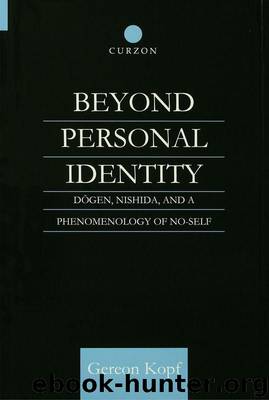Beyond Personal Identity: Dogen, Nishida, and a Phenomenology of No-Self (Routledge Studies in Asian Religion) by Kopf Gereon

Author:Kopf, Gereon [Kopf, Gereon]
Language: eng
Format: azw3
Publisher: Taylor and Francis
Published: 2012-12-05T16:00:00+00:00
The Collapse of Continuity
Before I proceed to examine Dōgen’s notion of continuity, I would like to briefly consider Nāgārjuna’s position on this issue. As one might guess from my previous discussions of his thought, Nāgārjuna radically defies any notion of continuity. The very rejection of continuity itself is not that revolutionary since the concept of nirvāṇa is defined as the cessation of karmic activities. What changes the situation in Nāgārjuna’s case, however, is his collapse of saṃsāra and nirvāṇa: “saṃsāra (that is, the empirical life-death cycle) is nothing essentially different from nirvāṇa. Nirvāṇa is nothing essentially different from saṃsāra” (Nāgārjuna 1970, 158), and, subsequently, he denies the continuity of experience within the realm of saṃsāra as well. Following his general argument, Nāgārjuna is denying, most of all, the conceptualization of continuity and action-and-effect (Skrt.: karmaphala); what makes his thought so interesting for the present enterprise is that he functions, in some loose sense, as the link, historically and conceptually, between the early Buddhist theories of continuity and Dōgen’s religious thought. To set the stage for Dōgen’s religious thought, I will present Nāgārjuna’s arguments against causality and action-and-effect.
In his famous refutation of causality, executed in the first chapter of his Mūlamadhyamikakārikā, Nāgārjuna employs the Buddhist method of the tetralemma (also referred to as the Catuskoti). Examining the relationship between cause and effect, Nāgārjuna lists four possible scenarios: (1) cause and effect are identical, (2) cause and effect are different, (3) cause and effect are identical and different, and (4) cause and effect are neither identical nor different. None of these options, however, is satisfactory since (1) implies an unchanging identity devoid of causality, (2) suggests an absolute discontinuity, again, devoid of causality but rather subject to chance, (3) contains a contradiction, while (4) denies any causal relations to begin with. In the first case, the causal relationship of E1 > E2 is replaced by an identity relation in the sense of E1 > E1. The second case, on the contrary, which is devoid of any connection between cause and effect, cannot explain causality either since it replaces causal necessity with acausal arbitrariness and, subsequently, defies any kind of causal lawfulness and regularity. At the most, it gives rise to a continuity of the form –E5–E2–E7–E1–E4–. In addition, the same argument proves devastating for the notion of a continuity established by positionality: The notion of an unchanging identity in the first case does not leave any room for the thetic awareness which freely and creatively projects what-it-is-not by negating what-it-is. The irregularity of chance, on the other hand, renders the creativity of thetic awareness meaningless and, ultimately, inefficient. Nāgārjuna, subsequently, concludes that the notion of linear causality is not viable.
In his chapter on the “Examination of Action and its Effect” (“Karmaphala Parīkṣā”), Nāgārjuna advances two arguments to undermine the notion of a causal continuity: (1) The first argument is based on the incompatibility of the notions of endurance and change, (2) the second argument is based on his refutation of “self-nature.” Since
Download
This site does not store any files on its server. We only index and link to content provided by other sites. Please contact the content providers to delete copyright contents if any and email us, we'll remove relevant links or contents immediately.
| Anthropology | Archaeology |
| Philosophy | Politics & Government |
| Social Sciences | Sociology |
| Women's Studies |
Cecilia; Or, Memoirs of an Heiress — Volume 1 by Fanny Burney(32097)
Cecilia; Or, Memoirs of an Heiress — Volume 3 by Fanny Burney(31487)
Cecilia; Or, Memoirs of an Heiress — Volume 2 by Fanny Burney(31438)
The Great Music City by Andrea Baker(30932)
We're Going to Need More Wine by Gabrielle Union(18664)
All the Missing Girls by Megan Miranda(14867)
Pimp by Iceberg Slim(13829)
Bombshells: Glamour Girls of a Lifetime by Sullivan Steve(13718)
Fifty Shades Freed by E L James(12939)
Talking to Strangers by Malcolm Gladwell(12919)
Norse Mythology by Gaiman Neil(12884)
For the Love of Europe by Rick Steves(11728)
Crazy Rich Asians by Kevin Kwan(8912)
Mindhunter: Inside the FBI's Elite Serial Crime Unit by John E. Douglas & Mark Olshaker(8754)
The Lost Art of Listening by Michael P. Nichols(7195)
Enlightenment Now: The Case for Reason, Science, Humanism, and Progress by Steven Pinker(6893)
The Four Agreements by Don Miguel Ruiz(6344)
Bad Blood by John Carreyrou(6295)
Weapons of Math Destruction by Cathy O'Neil(5874)
